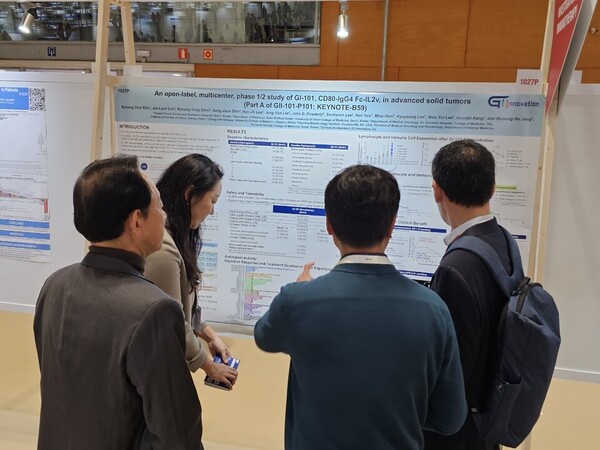
MADRID -- By Kim Chan-hyuk Korea Biomedical Review correspondent -- GI Innovation has unveiled the phase 1/2 clinical trial results of its immunotherapy candidate, GI-101. Professor Cho Byoung-chul, head of the lung cancer center at Yonsei Cancer Center, presented the clinical results that GI-101 showed high tolerability.
At the European Society for Medical Oncology Annual Meeting (ESMO 2023) in Madrid, Spain, on Monday (local time), GI Innovation presented partial results of phase 1/2 clinical trial of GI-101 (GII-101-P101, KEYNOTE-B59) in combination with anti-PD-1 immunotherapy Keytruda (pembrolizumab) in patients with metastatic solid tumors in a poster format.
GI-101, a bifunctional fusion protein, is designed to target CD80 and IL-2v (a variant of IL-2). Its development aims to address the limitations of single immune checkpoint inhibitors or IL-2 agents. The trial is currently in progress, having enrolled its first patient in August 2021. The clinical data presented pertains to the GI-101 monotherapy arm (Part A).
According to the poster presentation, the phase 1/2 study is the first human trial of GI-101. It is designed to include four cohorts of GI-101 monotherapy in combination with various agents, including Keytruda, Lenvima (lenvatinib), and radiology. In Part A, GI Innovation escalated the dose to finalize the recommended phase 2 dose (RP2D) and added additional cohorts. The primary endpoints are safety, tolerability, and objective response.
As of the data cut-off on April 20, 57 patients (19 in the dose-escalation cohort and 38 in the expansion cohort) had received GI-101 alone. The median number of prior therapies was three [1-11], and 47 percent had received prior immunotherapy.
No dose-limiting toxicities (DLTs) were reported in the expansion cohort (0.002 to 0.3 mg/kg), and the maximum tolerated dose (MTD) was not reached. Therefore, RP2D was established at 0.3 mg/kg every three weeks (Q3W). Treatment-emergent adverse events (TEAEs) occurred in 55 (96 percent) of all patients, and the most common adverse events of more than 30 percent were pyrexia (67 percent) and transient AST elevation (37 percent).
Objective responses were observed in three of 50 assessable patients, regardless of prior anti-PD-(L)1 therapy. One confirmed complete remission (CR) (cervical cancer), one confirmed partial remission (PR) (urothelial carcinoma), and one unconfirmed PR (non-small cell lung cancer) were confirmed, with CR lasting more than 144 days in one patient.
The disease control rate (DCR) was 46 percent, and median progression-free survival (PFS) was 41 (21-294) days. In patients with microscopically stable colorectal cancer (MSS CRC) with liver metastases, a significant lesion reduction of 53 percent was observed (over 429 days of treatment). GI-101 increased peripheral lymphocytes by a median of 3.4-fold [2.0-8.4] in RP2D, and increased lymphocytes correlated with improved PFS (P=0.00515).
"Safety is the most important aspect of the combination, and with less than 5 percent of grade 3 or higher adverse events in 61 patients related to treatment, it was very safe and well tolerated, especially compared to Proleukin (aldesleukin)," Professor Cho said
Particularly in immuno-oncology refractory patients, an increase in PFS was observed when immune cells were sufficiently increased, he added, noting its potential to overcome immuno-oncology refractoriness.
"Recently, the importance of CTLA4 in cold tumors has been rediscovered," Cho said. "GI-101 inhibits CTLA4 through CD80, which inhibits the function of regulatory T cells. Through a CTLA4-targeted IL-2 mechanism of action, GI-101 demonstrated significant clinical anti-cancer activity in patients with MSS CRC, a highly refractory tumor, with more than 50 percent reduction.”
He explained that in a group of patients with late-stage cancer who had failed all standard therapies, monotherapy alone demonstrated significant monotherapy anti-cancer activity with objective responses, one CR, and three PRs.
"In patients with pMMR cervical cancer, CR cases have remained responsive for more than seven months and are still on therapy. The duration of response (DoR) of more than six months with monotherapy alone is encouraging,” Professor Cho said.
Related articles
- [ESMO 2023] Has Korean CAR-T treatment Anbal-cel won the greenlight at ESMO?
- [ESMO 2023] Yuhan's NSCLC drug Leclaza shows potential as 1st Korean blockbuster drug
- [ESMO 2023] Keytruda-Padcev combo takes 'crown’ as 1st-line cure for urothelial cancer
- [ESMO 2023] Lunit, Medpacto, TiumBio present research results at ESMO 2023
- [ESMO 2023] Keytruda cements its position as 1st-line treatment for HER2+ gastric cancer
- [ESMO 2023] ‘HLB will apply for European authorization for rivoceranib this year’
- [ESMO 2023] Global competition for anticancer therapies opens yearly event in Europe
- GI Innovation speeds up development of immuno-oncology drug in SC formulation

